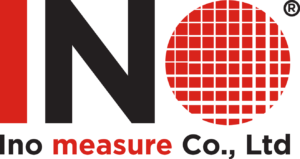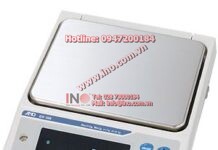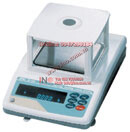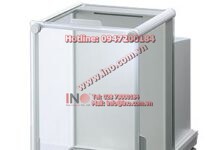Overview
With its ability to process up to 100 averaged spectra per second, while responding proportionally to multiple ions in each detector pulse, the FASTFLIGHT-2 is a superior solution for data acquisition in LC/TOF-MS and GC/TOF-MS applications. Chromatograph technology is advancing towards shorter retention times, and this pushes the time-of-flight
mass spectrometer (TOF-MS) to acquire averaged spectra much more rapidly. FASTFLIGHT-2 improves the TOF spectra processing rate by a factor of 10 compared to first-generation digital signal averagers, thus enabling much faster chromatographs.
Because it employs a sampling ADC and a hardware digital signal averager, FASTFLIGHT-2 can handle the high ion rates encountered in LC/TOF-MS, GC/TOF-MS, Ion-Trap/TOF-MS and MALDI I TOF-MS without suffering the dead-time distortions inherent in a time-to-digital converter (TDC). Compared to transient digitizers and digital sampling oscilloscopes, which suffer from slow software averaging, FASTFLIGHT-2 delivers averaged spectra many orders of magnitude faster.
The innovative, automatic correlated noise subtraction feature means FASTFLIGHT-2 can also be a productive solution for the lower ion rates encountered in quadrupole/quadrupolefTOF mass spectrometers (QqTOF-MS), previously considered to be the exclusive domain of TDCs and time digitizers.
- 250 ps interleaved and 500 ps real-time sampling intervals helps resolve the narrowest peaks
- Sustained TOF-MS rates up to 100 averaged spectra/s (with negligible dead time) in the Chromatograph/TOF-MS mode for super-fast chromatographs
- Simple cable connection to the USB-2 port on your PC no need to find scarce space inside your computer
- Automatic data compression by factors up to 400:1 greatly reduces the chromatograph/TOF-MS file size
- Automatic correlated noise suppression to <0.004% of full scale resolves a 25,000:1 concentration range
- Rapid Protocol Port for changing acquisition modes with 10µs for multiplexed, multimode chromatographs
Specifications
| Hardware | |
| PERFORMANCE | |
| Amplitude Digitizing Resolution | 8 bit- ADC nominally spans 500 mV at the Analog Input. |
| Precision Enhancer | Extends the limiting ADC resolution to 12 bits (for input noise <2 mV) when circa 256 or more records are averaged3. Optionally, on or off. |
| Differential and Integral Non-Linearity (DNL and INL) | Measured from 5% to 95% of full scale using a 500 mV, 70 µs ramp, with Precision Enhancer on. DNL within ±0.1 LDB referred to the 8-bit ADC. INL within ±0.4% of full scale. |
| Analog input Bandwidth | DC to 500 MHz; rise adn fall times <1 ns. |
| Equivalent input Noise | (Measured with 500 ps sampling and 50 µs record lenght.) Uncorrelated with the Trigger <2 mV rms. Correlated with the Trigger <0.02 mV (typically 0.01 mV rms) with Automatic Correlated Noise Substruction. |
| Automatic Correlated Noise Substruction | Automatically assesses the correlated noise in each spectrum and substracts it without compromising data throughout rates. Optionally, on or off. |
| Analog DC Offset (Vertical Offset) | Zero offset of the ADC is computer adjustable from -250 mV to +250 mv with 0.03 mV resolution, referred to the Analog input. |
| Sampling intervals | Hardware 500 ps, 1 ns or 2 ns real-time sampling with one scan per pound; 250 ps interleaved sampling with two scans per second4. Software can display 250 ps interpolated sampling from a spectrum sampled at 500 ps. |
| Record Size (Hardware) | 8 bits per sampled point and up to 1.5 M points per record (at 250, 500, 1000 ir 2000 ps/point. Record length selectabel from a minumum of 10 µs to a maximum of 1.5 M points in steps of 512 points. |
| Spectrum Size (Hardware) | Identical to Record Size, except 24 bits per sampled point, providing rapid hardware summing of up to 65,535 records ub a spectrum. |
| ADC Sampling Interval (ps) |
Min. Spectrum Length (µs) |
Max. Spectrum Lenght (µs) |
|
250 |
10 |
375 |
|
500 |
10 |
750 |
|
1000 |
10 |
1500 |
|
2000 |
10 |
3000 |
| Data Acquisition Delay (Time Offset) | Computer selectable digital delay after trigger from 0 to 1048.56 µs in 16-ns steps. The record starts after the selected delay. |
| Dead Time | End-of-Scan 0.8 µs. End-of-Spectrum 0.8 µs. |
| Sampling Clock | 2 GHz ±5 ppm; temperature sensitivity: within ±2.5 ppm, 0ºC to 50ºC. |
| Trigger-to-First-Sample Jitter | Trigger Input within 500 ps (next clock pulse). Trigger Output <50 ps FWHM. (The Trigger Output is alternatively delayed by 0 and 250 ps relative to the sampling clock in the 250 ps interleaved sampling mode.) |
| Operating Temperature Range | 0 to 50ºC |
| Averaging Method | Linear summation of sequential records. |
| Selectable Stop-Acquisition Limits | Maximum Time 1 second to 65,535 seconds ( 8 hr.), in 1-second steps, or disabled. Max. Number of Spectra > 18,000. Limited only by available memory in the supporting PC and the data storage disk. |
| Data Compression | Implemented in the hardware with no compromise in data throughout. Lossiess Compression down to 2/3 the normal 24-bit file size in spectra dominated by background, and with no loss of original data. Peak-Preserving and Background-Rejecting5 Automaticallly separates peaks from background. Transmits peaks and adjacent background points. Typically decimates 98% of the background points between peak regions. Data compression by a factor of 10 to 30, depending on peak density. Peak Centroid and Net Area Tranmits only the centroid and net area of automatically detected peaks. Provides an additional factor of 9 data compression relative to Peak- Preserving and Background-Rejecting compression. |
| Maximum Data (Spectra) Transfer Rate | Up to 100 spectra/s transferred to PC RAM and hard disk for a 50 µs spectrum length and 500 ps sampling in the Chromatograph/TOF-MS mode. |
| Total-ion/Specific-ion Chromatographs | Automatic hardware computation of real-time Chromatograph displays with each point in the chromatograph linked to the supporting time-of-flight spectrum. Provides exact time synchronization of the chromatograph with the TOP-MS when analyzing the output of an LC or GD. The vertical chromatograph coodinates is: Total-ion Chromatograph The sum of the areas above background for all peaks in each spectrum. Specific-ion Chromatograph The net area above background in the TOF-MS peak selected by the operator. Optional pre- and post-acquisition selection. |
| Time Stamp | 42 bits in the spectrum header are allocated to recording the starting time of each spectrum with 10 µs precision. Maximum: circa 1.4 years. |
| Spectrum Number | 21 bits in the spectrum header are allocated to recording the sequential spectrum number. Maximum limit is circa 2 million. Reset to zero on each acquisition start. Otherwise, this counter runs continuously, even when software stops reading the 32 MB FIFO output. |
| Output Buffering | During the last record in each spectrum the sum of all records in the spectrum is written to a one-spectrum-deep output buffer, and the summing memory is released to acquire the next spectrum. this limits end-of-spectrum dead time to 0.8 µs. After data processing in the compressor, the spectrum is loaded into a 32 MB output FIFO memory to accommodate intermittent data transfer over the USB-2 bus to the PC without loss of spectra. the output FIFO has a capacity of at least 7 spectra. |
| Rapid Protocol Selection | Provides a hardware interface to change acquisition parameters in real time with 10 µs. Includes 4 bits to select the hardware parameters defined in one of 16 products, and an additional 4 bits to insert one of 16 tags in the spectrum header. The tags can be used to identify unique acquisition conditions from other parts of the mass spectometer. |




















